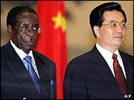
The Beijing Olympics may be just around the corner, but the dream among human rights activists that the games might push the Chinese towards being a responsible stakeholder in international affairs has run up against an appalling recent track record in Africa.
In Sudan, the BBC recently uncovered evidence of Chinese military support for the Sudanese government in Darfur, a violation of the UN’s arms embargo made all the more egregious by its discovery coinciding with the decision of the Prosecutor of International Criminal Court to charge President Omar al-Bashir for genocide, crimes against humanity, and war crimes.
On Zimbabwe, where Robert Mugabe stole reelection and inflation is now at 2,200,000%, China joined with Russia to veto targeted sanctions that would have imposed an arms embargo and travel and financial restrictions on Mugabe and 13 of his top henchmen. These sanctions would have imposed a direct cost on the men most responsible for the campaign of terror and violence that made free and fair elections impossible, without affecting Zimbabwe’s imploding economy.
The good news is that China’s blatant support for Zimbabwe may prove a misstep that could limit its ability to defend ally and suspected war criminal Omar al-Bashir at the Security Council. The Zimbabwe veto infuriated Britain and the United States (President Bush said he was “displeased”) who are now more likely to veto any efforts by China to support the suspension of the International Criminal Court’s case against Bashir.
The bad news is that the U.S. continues to push issues like Sudan and Zimbabwe to the Security Council without the high level bilateral diplomacy with China that is necessary to support effective action. Despite the company he may find there, President Bush has defended his decision to attend the opening ceremony of the Olympics on the grounds that not going would “make it more difficult to speak frankly with the Chinese leadership.” But until such conversations include subjects like stopping support for genocide and crimes against humanity in Africa, the U.S. is unlikely to garner effective responses to these issues at the U.N. headquarters in New York.
An equally important question looms for Beijing as it tries to assert itself as a major world power: Does China really want to be known around the globe as the chief defender of war criminals, tyrants and bad governments in general? From Sudan and Zimbabwe to Burma and North Korea, China is quickly and rightly becoming known as every despot’s best friend.
This post orginally appeared in the Wonk Room at the Center For American Progress Action Fund.

